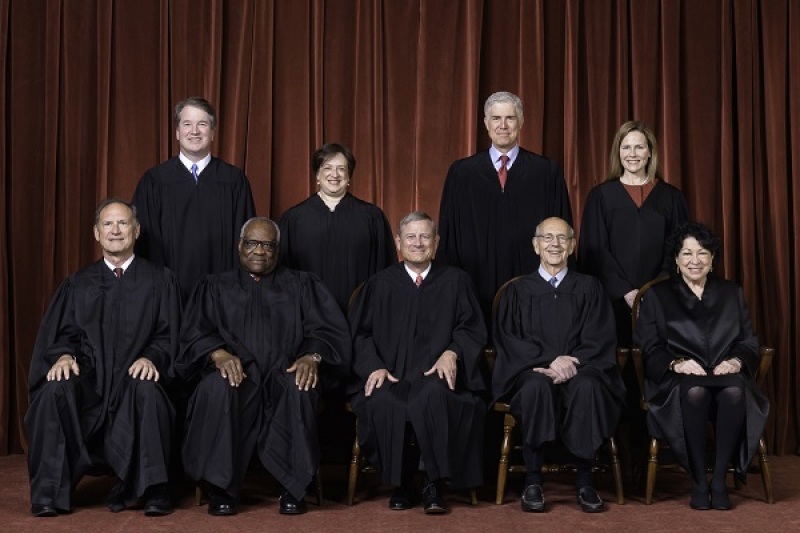
The United States Supreme Court justices are reportedly "poised" to uphold the Mississippi Gestational Age Act, which could lead to overturning Roe v. Wade.
CBN News reported that the Supreme Court justices seemed to be "poised" to uphold the constitutionality of states banning abortions for 15 weeks of pregnancy that the Mississippi Gestational Age Act stipulates. Constitutional experts who monitored the oral arguments conducted in the Supreme Court in line with the said state law noted this.
"And the six conservative-leaning justices appear poised to uphold the Mississippi law that bans abortions at 15 weeks of pregnancy. They could even take it a step further, which would mean overturning the so-called national right to abortion created under the landmark Roe case in 1973," CBN News said.
The Democrats fear that the conservative-leaning justices would favor the Mississippi law and overturn Roe v. Wade, such that threats of a revolution and court packing were made.
The Supreme Court is perceived to be predominantly conservative. The most conservative of the justices are Georgia-native Associate Justice Clarence Thomas, Colorado-born Associate Justice Neil Gorsuch, and New Jersey's Associate Justice Samuel Alito.
While New York-born Chief Justice John Roberts, Jr., Washington D.C.'s Associate Justice Brett Kavanaugh, and Louisiana's Associate Justice Amy Coney Barrett are in the middle when it comes to being conservative. The rest of the justices--Associate Justices Sonia Sotomayor, Elena Kagan, and Stephen Breyer--are the least conservative.
The justices are focusing their arguments on the legal principle of "stare decisis," which is on the timeliness of deciding to overturn Roe v. Wade in the light of the various briefs forwarded to them, highlighting the truths of and advancements in science especially in line with the unborn.
Such a change, some of the justices said, would affect the "country's trust" on the court's credibility since it is perceived as a conservative majority and, thus, its decisions would be seen as merely "political."
"Will this institution survive the stench that this creates in the public perception that the Constitution and its reading are just political acts. I don't see how it's possible," Sotomayor said.
"They're going to be ready to say, 'You're just political, You're just politicians.' And that's what kills us, as an American institution," Breyer added.
Meanwhile, Barrett showed favor for Mississippi's petition to overturn Roe v. Wade based on a report from Life News, which posited that the conservative justice has rebuked pro-choice advocates' claims that "abortion bans force women to be pregnant."
Barrett asked a question that targeted the heart of the principle that "makes abortion so essential" by citing its relationship to parental rights through the "burden of parenthood" that is "diminished by safe-haven laws." Safe haven laws allow mothers to put their children into adoption instead of aborting them out of the burden of motherhood.
"In all 50 states, you can terminate parental rights by relinquishing a child after abortion. Why don't you address the safe haven laws and why don't they matter? It seems to me that the choice for focus would be between, say, the ability to get an abortion at 23 weeks or the state requiring the woman to go 15, 16 weeks more and then terminate parental rights at the conclusion," Barrett said during the hearing, addressed to the lawyers of Jackson's Women's Health Organization.
Kavanaugh, on the other hand, directly indicated that Roe v. Wade can be overturned noting that the United States Constitution is neutral to abortion. He cited prior decisions of the Supreme Court that were overturned by the justices such as the Brown v. Board of Education and Obergefelle v. Hodges.
Finally, Roberts stressed that America's abortion laws are similar to Communist China's and North Korea's citing the Charlotte Lozier Institute study on the Mississippi Gestational Act Act, which bans abortions on 15 weeks of pregnancy and which is the very focal issue behind the Dobbs v. Jackson case. Roberts asked the pro-abortion lawyers on viability and pointed out that it has nothing to do with women's rights.
"If you think that the issue is one of choice...viability, it seems to me, doesn't have anything to do with choice. If it really is an issue about choice, why is 15 weeks not enough time?" Roberts said.
"I'd like to focus on the 15-week ban because that's not a dramatic departure from viability. It is the standard that the vast majority of other countries have. When you get to the viability standard we share that standard with the People's Republic of China and North Korea," he added.























